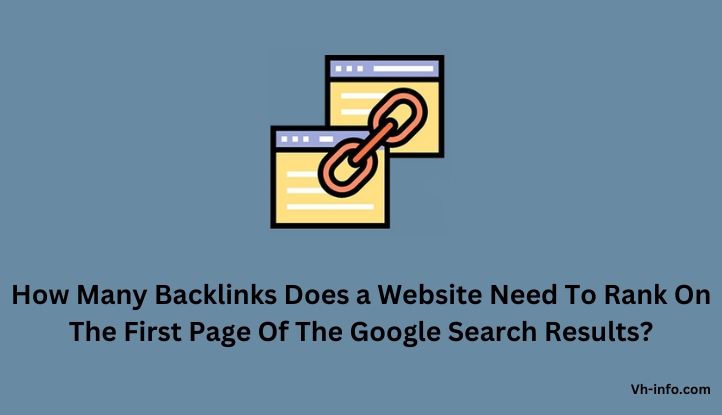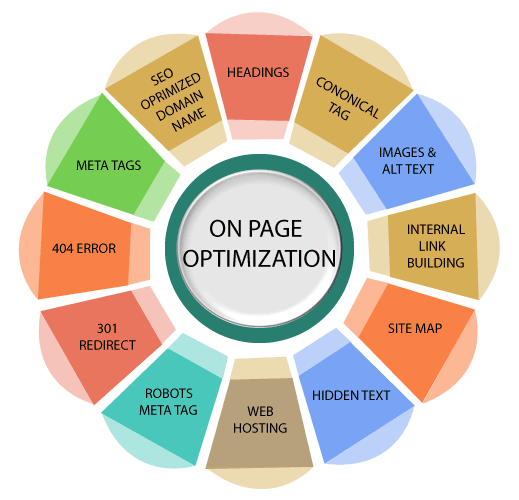Backlinks are one of the cornerstones of search engine optimization (SEO).
They act as endorsements from other websites, indicating to search engines that your content is valuable and should be ranked higher in search engine results pages. Google, in particular, places significant emphasis on the quality of backlinks, considering them as one of the top ranking factors in its algorithm.
While backlinks are important, determining the exact number of backlinks needed for effective ranking is not an exact science.
It depends on various factors that are unique to each website, such as the competitiveness of the niche, the authority of the website, the quality of the content, and the authority of the backlinks.
At Vh-info, we understand the importance of backlinks and have a team of experts who conduct research to help our clients find the right solutions for their websites.
In this complete guide, we will explore the factors that influence the number of backlinks needed to rank, as well as strategies to acquire high-quality backlinks.
Do You Need Links To Rank?

Yes, backlinks are still crucial for ranking in search engines. While there is some debate about the exact importance of backlinks in Google’s algorithm, they remain one of the top ranking factors. Google uses complex algorithms to evaluate the quality and relevance of backlinks.
How Many Backlinks Do I Need to Rank?
To rank well, aim for around 40-50 backlinks to your homepage and up to 100 backlinks for each page. Remember, quality beats quantity; one strong PR9 backlink is more valuable than ten weaker PR1 links. So focus on getting high-quality backlinks to improve your SEO performance.
How Many Backlinks Do You Need to Build?
The number of backlinks you need to build depends on your goals. For brand awareness and PR, focus on getting many quality, relevant links. If your goal is ranking, aim to build more links than your competitors. However, tools like SEMRush or Ahrefs may show inflated metrics, so it’s crucial to analyze link quality rather than just quantity for effective SEO.
How Many Backlinks Does a Website Need To Rank On The First Page Of The Google Search Results?

Ranking on the first page of Google’s search results requires a combination of factors, including the number and quality of backlinks. While there is no specific number of backlinks that guarantees first-page rankings, studies have shown that top-ranking pages tend to have more backlinks than lower-ranking pages.
According to a study by Ahrefs, pages that rank in the top 10 search results have an average of over 35,000 backlinks. However, it’s important to note that this is just an average and the number of backlinks needed can vary depending on the competitiveness of the keyword and the authority of the website.
5 Steps to Determine the Number (and Quality) of Backlinks You Need to Rank

I’ll guide you through the process of choosing backlink targets and figuring out the quantity and quality of links required for immediate ranking and ongoing competitiveness in search engine results.
Step 1. Identify Your Highest Priority Backlink Targets
To figure out the backlinks needed, begin by identifying top sites in your niche that attract your audience. Look for popular blogs or news websites where your audience frequents.
Select sites with high trustworthiness (domain authority) to improve your site’s ranking. Quality backlinks are crucial; prioritize them over quantity.
Make a list of these key sites and their contact details for future link-building efforts. Focus on a few strong backlinks rather than numerous weak ones.
Identify important backlink sources that align with your niche, have high domain authority, and appeal to your target audience.
Step 2. Review SERP Data
To find out how many backlinks you need to rank, first check the search results for your keyword. Study the top pages’ backlink profiles for guidance on what you’ll need. Search your keyword on Google to see the top pages and study their backlinks. Note how many they have, their quality, and where they come from.
Here is an example of a text table to help you analyze the backlink profiles of the top-ranking pages:
Ranking Position | Page URL | Number of Backlinks | Quality of Backlinks |
1 | www.example.com/page1 | 100 | High |
2 | www.example.com/page2 | 80 | Medium |
3 | www.example.com/page3 | 50 | Low |
By analyzing the SERP data, you can get a better understanding of the number and quality of backlinks you will need to rank effectively. This information can help you set realistic goals for your link building efforts.
Step 3. Review Competitor Backlink Profile
The next step to know how many good backlinks you need is studying your top competitors’ backlinks.
Find who competes with you online and sees what links they have. This helps set your targets.
Look at the number, quality, and variety of websites linking to them to understand what you need.
Also, see if these links are from blogs, news sites, or specific niche platforms to plan your strategy.
Step 4. Assess Domain Rating Distributions
To figure out how many backlinks you need, consider the domain rating (DR) breakdown in your niche. Domain rating gauges website credibility and power. Sites with higher ratings positively impact your website’s ranking.
Use Ahrefs or Moz tools to identify good sites for backlinks based on their domain ratings. Seek out highly rated websites since search engines trust them, boosting your site’s ranking.
Assessing domain ratings helps target suitable sites for backlinks, focusing on high-rated ones to boost your site’s authority. This process is crucial in determining your required quality backlinks.
Evaluating domain ratings in your niche is essential to grasp the necessary backlink quantity. High-rated sites hold authority, enhancing your rankings when linked from them.
Step 5. Determine Link Velocity Targets
To figure out how many links you need, look at your link growth rate. This means how quickly you get new links. It’s crucial to grow your links steadily and naturally to keep your website ranking well.
Think about your website’s situation and what you can manage when setting link goals. Slowly building links is safer. Try to keep a stable pace of link growth to prevent sudden changes.
Have practical goals for continuous link building success. The quality and regularity of links are vital. Decide on achievable aims according to your site and capabilities for better outcomes. Slowly increasing links is most effective for success.
Proven Strategies to Acquire Backlinks

Acquiring high-quality backlinks is an essential part of any successful SEO strategy.
Here are some proven strategies to help you acquire backlinks:
- Blogger Outreach: Engage with influential bloggers in your industry and offer them valuable, unique content that would resonate with their audience. This can lead to backlinks and expose your brand to a wider audience.
- Creating High-Quality Content: Produce exceptional, insightful, and easily shareable content that provides value to your target audience. High-quality content tends to attract organic backlinks naturally.
- Leveraging Guest Posts: Contribute guest posts to reputable blogs or websites in your industry. This not only secures valuable backlinks but also showcases your expertise and extends your brand’s reach.
- Competitor Link Building: Analyze the backlink profiles of your top competitors and identify potential backlink opportunities. Target websites that are linking to your competitors and offer them valuable content or partnership opportunities.
- Niche Edits: Insert backlinks into existing, high-quality articles on other websites. This strategy capitalizes on the SEO value of content that search engines have already indexed and ranked favorably.
These strategies have proven to be effective in acquiring high-quality backlinks. Remember to focus on building backlinks from reputable and authoritative websites in your niche. Quality outweighs quantity when it comes to backlinks.
How Many Backlinks Per Month Are Safe?
For a safe and effective backlink strategy, focus on quality over quantity, aiming for around 10 high-quality backlinks per month for new websites and 40-50 for established ones. Avoid manipulative practices and build rapport with industry experts to earn backlinks. Monitor your backlink growth rate and ensure backlinks are indexed for optimal results.
How Does My Overall Strategy Impact How Many Backlinks I Need?
Your overall SEO strategy significantly impacts the number of backlinks you need. A focused approach, targeting three to five keywords per page with low difficulty scores and aligning content with user search intent, can help you rank well with fewer backlinks. Additionally, strategically placing internal links, especially from the homepage, and gradually adding more quality internal links over time, can further boost your SEO performance without relying solely on external backlinks.
How Do I Get Backlinks to My Website?

The number of backlinks you need can change based on your project. Aim for a few powerful links for your most relevant pages.
There are several strategies you can use to get backlinks to your website:
Create High-Quality, Original Content
Creating high-quality and original content is one of the most effective ways to attract backlinks to your website. Valuable and shareable content naturally captures the attention of other websites and encourages them to link back to your content.
When creating content, focus on providing unique insights, solving specific problems, or offering comprehensive guides in your niche. This type of content is more likely to be shared and linked to by other websites, increasing the chances of acquiring high-quality backlinks.
In addition to attracting backlinks, high-quality content also improves the overall user experience on your website and establishes your brand as an authority in your industry. This can lead to increased organic traffic and improved search engine rankings.
Get Rid of Broken Links
Broken links can harm your Google ranking. Regularly check your website for broken links using a tool. Additionally, look for broken links on other websites. Politely reach out to the website owner with a well-structured email. Compliment their content, point out the broken links, and suggest linking to your relevant content instead. This approach can help you secure valuable backlinks and improve your website’s SEO performance.
Is It Possible To Rank Without Backlinks?
Yes, it is possible to rank on Google without backlinks, especially for long-tail and less competitive keywords. The key is to create valuable, high-quality content that matches the search intent of the keyword.
Optimizing your content with tools like Clearscope and building research reports can also help improve your rankings without relying on backlinks.
However, for highly competitive keywords, backlinks might still be necessary to outrank high-authority sites. Always analyze the competition and assess whether backlinks are required for your target keywords
How Many Links are Necessary for a New Website to Rank?
For a new website to rank effectively, it is safe to start with around 10 high-quality backlinks per month, gradually increasing to 40-50 as the website becomes more established. Quality backlinks from authoritative sites are crucial, and focusing on link quality over quantity is key to improving rankings and avoiding penalties from search engines.
How Many Backlinks Each Page on Your Website Should Have?
Each page on your website should aim for around 40-50 backlinks to the homepage and 0-100 backlinks to individual blog posts for an effective backlink profile. Quality over quantity is crucial, focusing on natural, relevant, and authoritative links to avoid penalties and improve search engine rankings.
How to Create a Quality Backlink Profile?
To create a quality backlink profile, focus on developing linkable content, such as industry research, in-depth how-to guides, statistics, and local guides. Utilize the skyscraper technique by improving on top-ranking content and reaching out to websites linking to the original piece. Turn mentions into links by reaching out to websites that have mentioned your business without linking. Guest blog for relevant sites, connect with your community, and optimize anchor text naturally. Partnering with a digital marketing agency can amplify your results
Variables that Make Backlinks More Effective
It’s important to focus on quality rather than quantity and aim to maximize these variables or follow guidelines and principles that emphasize this approach.
Several variables can make backlinks more effective in improving your website’s ranking.
These include:
Trust & Authority
Trust and authority are crucial factors that make backlinks more effective in improving your website’s ranking. Backlinks from trusted and authoritative websites carry more weight and credibility in the eyes of search engines.
When good websites link to your site, search engines see your content as valuable and trustworthy. This boosts your website’s ranking. Domain authority (DA) score measures a site’s trust and authority. High DA sites positively affect your backlinks. Getting links from trusted sources boosts your backlink profile and improves search engine rankings. Aim for reputable sources to enhance trust and authority.
Content
The quality of content around a backlink matters. It makes backlinks work better. Backlinks in good, related content add value and authority to your site.
Search engines like valuable, informative, engaging content. It helps your site rank well. Create top-notch content for your audience.
Related content is key too. Backlinks from similar sites with targeted content work best. When content and backlinks match, it boosts your site’s relevance and authority.
Focus on good, relevant content to boost backlink effectiveness and improve search ranking for your website.
The Niche Your Site is In and It’s Competition
The type of site you have and how many other similar sites exist can affect backlinks. Links from related sites in your field can boost your ranking.
When search engines notice that sites like yours link to yours, it shows your site’s importance. This connection can help raise your site’s visibility.
Also, the level of competition in your field impacts backlink effectiveness. In tough markets, more quality links are needed for ranking. In easier ones, fewer may suffice.
By focusing on niche websites and competition levels, you can make backlinks work better and increase your site’s rank.
How Specific to that Niche Your Site Is
The specificity of your website to a particular niche can greatly influence the effectiveness of backlinks. Backlinks from websites that are closely related to your niche and offer targeted content tend to be more effective.
When other relevant websites link to yours, search engines notice and view your site as important. This boosts ranking and visibility in search results. To get such backlinks, create content related to your industry, attracting more credible and influential links.
Tailor your content to meet the needs of your niche audience. This approach helps draw valuable backlinks and boosts your site’s search engine ranking.
On-Page Optimization

On-page optimization plays a crucial role in making backlinks more effective.
When your webpages are well-optimized for search engines and provide a great user experience, it enhances the impact of your backlinks.
Ensure your webpages have good on-page SEO with keyword optimization. Research and use relevant keywords naturally.
Optimize webpage structure, headings, subheadings, and internal links for better visibility. Use clear anchor text for links.
This helps search engines crawl and understand your content easily. On-page optimization boosts backlink effectiveness and website visibility in search results when paired with quality backlinks.
Anchor Text and How Natural Your Link Profile Is

The anchor text of your backlinks and the naturalness of your link profile are important factors in making backlinks more effective.
Anchor text is the clickable text of a hyperlink. It’s crucial to use relevant and varied anchor text. Avoid overloading with keywords, as this may seem manipulative. Instead, be descriptive with your anchor text.
A good link profile has various backlinks and anchor text types. This mix shows natural link building. Make sure search engines see your links as natural, not forced.
Link Diversity

Link diversity means having a good mix of different types of natural backlinks.
For example, you’d want links from guest posts, editorials, authority sites, and social bookmarks, mostly Dofollow. It’s also good to get links from educational, government, news, blogs, Web 2.0, and directories. This mix makes your link profile look natural and trustworthy to search engines.
Besides external links, internal links from powerful pages to your target page are beneficial. Also, having links to both your target page and homepage is essential for a strong link profile, so aim to boost both if you can.
FAQ’s:
Are Too Many Backlinks Bad?
Yes, too many backlinks can be bad if they are of low quality or spammy. This can lead to sudden drops in rankings, especially if they use exact-match anchor text, are from toxic or irrelevant sources, or are part of a bad-link neighborhood. Quality and relevance are crucial for backlinks; earning powerful and relevant ones from high-traffic pages is key for a successful SEO strategy.
How Many Backlinks Do Search Engines Need To Rank My Content?
There is no specific number of backlinks that search engines require to rank your content. The number of backlinks needed depends on various factors such as the competitiveness of your niche, the authority of your website, and the quality of your backlinks. It is important to focus on acquiring high-quality backlinks from relevant sources that can positively impact your website’s ranking.
How Many Backlinks Do I Need To Start Seeing Results?
The number of backlinks needed to start seeing results varies and can depend on factors like industry, keyword difficulty, and content quality. It can take at least 10 weeks for a backlink to have an effect, with the full impact potentially taking several months or even over a year
The quality of backlinks is crucial, with high PageRank scores and links from authoritative sites being more beneficialIt’s important to focus on acquiring high-quality backlinks rather than just aiming for a specific number.
Can Too Many Backlinks Hurt My Site?
Yes, having too many backlinks can potentially harm your site, especially if they are of poor quality or acquired too quickly. Search engines like Google prioritize quality and relevance over sheer quantity. A sudden surge in backlinks or links from low-quality sources can raise suspicions of manipulative tactics, potentially leading to penalties and a drop in search rankings. It’s crucial to focus on gradual, organic growth with high-quality, relevant backlinks for long-term success.
How Do I Know If a Backlink Is Of High Quality?
A high-quality backlink typically comes from a relevant and authoritative website, with the link organically placed within the content, rather than in the footer or sidebar. The anchor text should be topically relevant, and the link should provide value to the reader.
Additionally, the linking website’s backlink profile should be strong, with a diverse range of high-quality links. Tools like Ahrefs can help you analyze the quality of a backlink by assessing factors such as Domain Rating, URL Rating, and the number of referring domains
What Should I Do If I Get a Bad Backlink?
If you discover a bad backlink pointing to your website, it is recommended to take action to address it. Use Google Search Console to identify and monitor your backlinks. If you find a bad backlink, you can request its removal or use the disavow tool to tell search engines to ignore it. Removing or disavowing bad backlinks can help maintain the quality of your backlink profile and improve your website’s ranking.
Conclusion
In conclusion, understanding the significance of backlinks for your website’s ranking is crucial. The quality, quantity, and relevance of backlinks play a significant role in boosting your site’s authority and visibility on search engines.
By following a strategic approach to acquiring backlinks, focusing on high-quality content creation, and maintaining a natural link profile, you can enhance your website’s credibility and improve its search engine rankings.
Remember, a well-rounded backlink profile is key to achieving long-term success in SEO. Stay informed, stay consistent, and watch your website climb the ranks!

